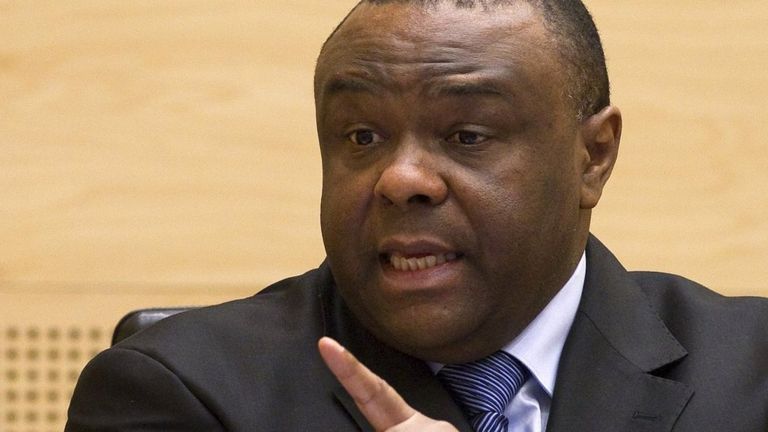 Former Congolese rebel leader Jean-Pierre Bemba has been found guilty of war crimes in a landmark trial at the International Criminal Court (ICC).
Former Congolese rebel leader Jean-Pierre Bemba has been found guilty of war crimes in a landmark trial at the International Criminal Court (ICC).
Bemba, 53, was accused of failing to stop his rebels from killing and raping people in neighbouring Central African Republic (CAR) in 2002 and 2003.
He had sent more than 1,000 fighters to help put down an attempted coup.
Bemba, once vice-president of the Democratic Republic of Congo, will remain in custody until sentencing.
The court in The Hague found him guilty of several charges including rape and murder. He is expected to appeal.
It is the first time the ICC has focused on rape as a weapon of war, and the first time a suspect has been convicted over crimes committed by others under his command.
Analysis – By Maud Jullien, BBC regional analyst
The fact that Bemba was convicted for sexual violence is significant. Many Congolese suspects have been accused of such crimes, but this is the first guilty verdict.
His conviction was for crimes committed in the Central African Republic, but it will send the message to high-ranking soldiers and militiamen in DR Congo, where sexual violence is rife, that they are responsible for preventing it.
But in Congo, despite his murky record, Jean-Pierre Bemba still enjoys significant popularity.
Members of his opposition party had hoped he would be released in time to run in the next presidential election, which is scheduled for the end of this year.
Welcoming the verdict, ICC chief prosecutor Fatou Bensouda said: “While the reality of the crimes is appalling, the significance of this decision is to be celebrated.
“What this decision affirms is that commanders are responsible for the acts of the forces under their control.”
Carrie Comer, from the International Federation for Human Rights, said the verdict was “a historic moment for victims of such unspeakable atrocities”.
It was “a strong message from ICC judges that commanders must prevent and punish war crimes,” she wrote on Twitter.
It is alleged that for a period of five months Bemba’s Movement for the Liberation of Congo (MLC) rebel fighters killed hundred of civilians, raped women and looted.
The court heard horrific accounts, including how a man, his wife, his daughters and his granddaughter were all gang-raped by militiamen.
Who is Jean-Pierre Bemba?
Jean Pierre BembaImage copyright Getty Images
Image caption
Mr Bemba had good relations with some of Africa’s leaders
◾1998: Helped by Uganda to form MLC rebel group
◾2003: Becomes vice-president under peace deal
◾2006: Loses run-off election to President Joseph Kabila but gets most votes in western DR Congo, including Kinshasa
◾2007: Flees to Belgium after clashes in Kinshasa
◾2008: Arrested in Brussels and handed over to ICC
◾2010: Trial begins
◾2016: Found guilty of war crimes and crimes against humanity
Profile: Jean-Pierre Bemba
More about DR Congo
Bemba’s lawyers argued that once the troops had crossed the border they were no longer under his command, but under the then-CAR President Ange-Felix Patasse.
But the presiding judge ruled that Bemba had effective control over the troops and was therefore “criminally responsible”.
Mr Bemba led the MLC during DR Congo’s brutal civil war. He is the son of a prominent businessman and a former assistant to ex-Congolese President Mobutu Sese Seko.
After a peace deal in DR Congo in 2003, he laid down his arms and joined an interim government.
Bemba is the most senior figure to face judgement at the court and only the third person to be convicted since the court’s founding in 2002.
Germain Katanga and Thomas Lubanga, both Congolese former warlords, have previously been found guilty of offences.
Q&A: Bemba conviction
What does this verdict mean for the ICC?
This is a rare success for a beleaguered institution. It is the court’s first conviction for rape as a war crime and establishes the principle that commanders are responsible for the actions of their subordinates.
Why have there been so few convictions?
The cases are often complex and so it takes a long time to go through the evidence. There are also logistical problems such as bringing witnesses from remote areas and organising translators. However, some cases have collapsed, most notably that of Kenya’s President Uhuru Kenyatta.
Why are most of its cases in Africa?
This is a question African leaders have often asked – they say the many African cases are evidence of discrimination. Critics say leaders such as Mr Kenyatta and Sudan’s Omar al-Bashir have used accusations of bias as a smokescreen to evade justice. One former president, Ivory Coast’s Laurent Gbagbo, is on trial accused of war crimes. And the ICC is investigating non-African cases.
Via @ BBC Africa
Ends




Hi there to all, how is everything, I think every one is getting more from this website, and your views…
That is so true. Omg, you nailed it. That is exactly typical Gambian attitude unfortunately, it is very depressing.
Ba Buwa is a great man! I first heard his name when I was in Kiang Karantaba Primary School between…
[…] cuatro cuestiones que el comité no pudo resolver son las siguientes: canepa kanye Bubba (Bobby) Sangiang y Momodo Lamine…
Honestly, everything you said here was true and valid. He is obviously my inspiration and motivation. He is my Dad.